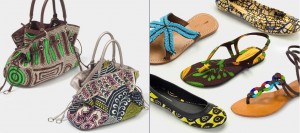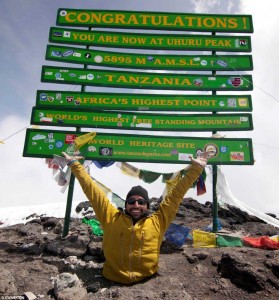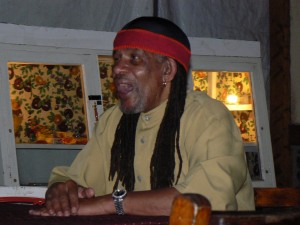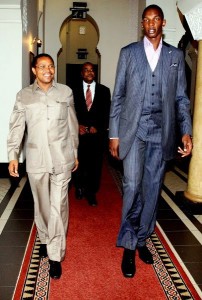by Donovan McGrath
Ethiopian, Tanzanian bag top honours at Addis fashion event – East African (7-13 May 2012)
Extract: ‘Ethiopia’s Mafi and Tanzania’s Doreen Mashika are the winners of this year’s Origin of Africa Designer Showcase in partnership with the Hub of Africa Fashion Week… Mashika took home the Ethical Fashion Award and the US Retailer Award – the two awards introduced this year. The US Retailers Award, from OneStopPlus.com, the online fashion mall, includes a supply contract while the Ethical Fashion Award includes the chance to participate in the Ethical Fashion Show in Paris… This year’s event, held at the African Union Conference Centre in Addis Ababa , featured established and upcoming fashion designers from Ethiopia, Nigeria, Mozambique, Angola, Democratic Republic of Congo, Ghana, Kenya, Uganda, Somalia and Tanzania.’
Tanzania: Popular herbal cure-all “ineffective” – IRN News
Extract: Dar es Salaam, 2 August 2012 (PlusNews) – A widely used concoction administered by Tanzanian herbalist Ambilikile Mwasapile (see TA 99) is ineffective, the country’s Health Minister, Hussein Mwinyi, has said. Mwasapile, a former Lutheran pastor who claims God revealed the treatment to him in a dream, has drawn hundreds of thousands to his home in Samunge village, Loliondo, in northern Tanzania’s Ngorongoro district, over the past 18 months. Believers claim it can cure a variety of diseases, including diabetes, cancer, tuberculosis and HIV. At the peak of his popularity, he was seeing up to 2,000 patients per day, each paying 500 Tanzanian shillings (about US$0.32) for one cup of the liquid. Mwinyi told parliament in Dodoma, the administrative capital, on 31 July that studies conducted over the past year found no discernible difference between people who used it and those who did not… Despite the warnings, many HIV-positive people abandoned their life-prolonging antiretroviral treatment after taking Mwasapile’s herbs.’
Tanzania’s hospitals hit hard by brain drain as sacked doctors seek jobs abroad – East African (16-22 July 2012)
Extract: ‘Investigations by The East African reveal that numerous doctors, nurses and midwives are leaving for Namibia, Zimbabwe, South Africa, Botswana, Lesotho and Swaziland. The move to leave the country follows the Medical Council of Tanganyika decision to cancel the provisional registration of more than 360 internship doctors who were involved in the recent strike… Namala Mkopi, president of the Medical Association of Tanzania, said they had pleaded with the doctors not to leave due to the invaluable services they offered. But the doctors said it was the only alternative given the government was in no hurry to resolve the situation… The government has already set aside Tsh200 billion ($100 million) to employ foreign doctors. The amount is way above the cost of training a doctor in country – Tsh100 m ($64,034) over five years.’
Flare-up – BBC Focus On Africa
‘Against a backdrop of soaring prices and growing demand, recent discoveries of oil and gas in East Africa seem too good to be true …’
Extract continues: ‘… Speaking on national television, [Kenyan] President Mwai Kibaki announced that oil had been struck in the East African Rift System in the northern county of Turkana. A further drill in May by the Anglo-Irish Tullow Oil and its Canadian partner Africa Oil, proved successful in the same Ngamia-1 concession which borders Ethiopia… Land-locked Uganda is only one example, amongst others, of a growing trend to prospect for oil in uncharted territories in East Africa. Global companies have been drilling or buying up exploration blocks off the coast of Mozambique, Tanzania and Kenya. But smaller exploration firms such as Ophir, Afren, Africa Oil and Premier Oil have been also scouting less conventional grounds for “black gold”
… However many fear that states have much more to do if they want to secure a fair share of revenues, and more importantly ensure that these revenues benefit the people and not only a small clique of politicians and business elites… Tanzania is drafting a new strategy to accommodate its future status as a “gas economy” and the expected inflow of billions of dollars in foreign investment. A gas and petroleum revenue management bill is expected to be drafted by the end of the year… The scale of gas discoveries in and off East Africa is unprecedented and has led many to believe that there must be more… [T]he fact that the region seems under explored naturally fuels more hope and even a sense of anticipation … where natural gas is found there is a good chance that oil will be found too.’
Dar gets wind energy plant – East African (16-22 April 2012)
Extract: ‘The managing director of state-run National Development Corporation (NDC), Gideon Nasari, confirmed the parastatal has secured a $123 million non-concessional loan from Exim Bank of Beijing China… The Singida wind park is expected to have an installed capacity of 1,800 MW when fully operational in the next five years… The demand for power in Tanzania is growing by more than 50 MW a year, fuelled partly by an expansion of mining undertakings in parts of the country. Currently, hydro is the major source of electricity in Tanzania… Wind power on a commercial scale is unknown in sub-Saharan Africa despite the existence of consistently strong winds …’
Brewers launch battle for African market – Sunday Telegraph (3 June 2012)
Extract: ‘A marketing war has erupted among drinks giants as they vie for a bigger slice of the continent’s growing wealth’
Extract continues: ‘An advertising war has broken out on the streets of Dar es Salaam between TBL, the country’s biggest brewer, and its arch rival Serengeti … Industry veterans such a SABMiller executive chairman Graham Mackay are now referring to Africa as the most important growth story of the next decade… Over the next two decades consumer companies are forecasting Africa will be hit by a positive “perfect storm” of a booming population, above average GDP growth and riches generated by rapidly expanding mining and energy industries… Twelve out of the 25 fastest-growing economies in the world are on the African continent… But it is also estimated that 75pc of the drinks market on the continent is still dominated by cheap home brews or illicit spirits.’
Barclays to redeploy staff and close 10 branches in Tanzania – East African (28 May- 3 June 2012)
Extract: ‘Barclays Bank managing director Kihara Maina said the decision was geared towards ensuring they delivered services according to expectations… The bank said interests of the affected employees would be looked after in accordance with the country’s laws and Barclays policies.’
Man who lost legs as a child scales Kilimanjaro – Telegraph (21 June 2012)
‘A man who lost both his legs as a child has become the first to scale Mount Kilimanjaro using his hands.’ Extract continues: ‘Spencer West, 31, from Toronto, Canada, reached the summit of the 19,342 ft mountain … after trekking for seven days. He climbed most of the journey on his hands, spending only 20 per cent of the trek in a custom-made wheelchair when the terrain wasn’t as steep or rocky. Mr West had his legs amputated below the knee when he was three-years old due to a genetic disorder – sacral agenesis. When he was five he had to have the rest of his legs removed below the pelvis… Mr West, who spent one year training for the expedition, scaled Africa’s highest peak with his two best friends David Johnson and Alex Meers… Only 50 per cent of those who attempt the mountain usually make it to the top.’
$1m fibre-optic network for cities – East African (14-20 May 2012)
Extract: ‘The project will be implemented in three phases. The first phase, which has already commenced in Dar es Salaam, will take six to eight months to complete.’
Extract continues: ‘[The fibre-optic] network is being set up in Tanzania to link the country’s major towns and improve connectivity between urban and rural areas… The second phase will involve connecting capital cities to the fibre network, while the third phase will focus on connecting remote towns still using satellite technology. Low Internet connectivity and high costs have been major hindrances to the government’s efforts to attract investments to the country… Six Telecoms along with its venture partners have already laid 15,000 kilometres of fibre in the region covering all major cities and towns in the East African Community. Sub-Saharan Africa continues to be the most digitally isolated region in the world …’
City lawyer “lost her £200,000 job after exposing corruption” – Telegraph (6 June 12)
‘A lawyer was sacked from her £200,000 a year job with a City law firm after she blew the whistle on corruption in the firm’s African section, a tribunal heard.’
Extract continues: ‘Krista Bates van Winkelhof says she was fired shortly after revealing bribes were being paid to gain clients and ensure results in Tanzania… Ms van Winkelhof, who was educated at UCL … was rated the number one lawyer in Tanzania by PLC Which Lawyer? and was also praised for “bringing a new energy and experience to the Tanzanian market”. In December 2009 she accepted a contract from Clydes making her an equity member and offering her future promotion… But the following year she had become alarmed at the behaviour of Ako Law’s managing partner, Kibuta Ongwamuhana, and worried he was paying bribes, the tribunal heard… Kibuta had admitted to her that he paid bribes to secure work and to secure the outcome of cases. “This allegation is denied by Clyde and forms the basis of the claimant’s whistleblowing complaint.” She was sacked by Ako Law … and returned to London … to discuss allegations made against her with bosses at Clyde …
[S]he was sacked from Clyde [and] now works for Anjarwalla and Khanna in Nairobi. Judge [Peter] Clerk [presiding over the hearing in London] said: “It is her case that her expulsion was a detriment on the grounds that she had made protected disclosures in respect of Kibuta, and/or amounted to unlawful sex discrimination on the grounds that a male partner would not have been treated in that way or it was pregnancy related. “She had recently informed Clyde that she was pregnant.” Clyde denies her allegations and also argued that the London tribunal did not have jurisdiction over the matter. The allegations were to do with the African firm, they said. But Judge Clerk rejected this claim and said the case could proceed.’
How climate change has got Worldwide Fund for Nature bamboozled – Telegraph (5 May 2012)
‘WWF has travelled too far from its original aim, to protect endangered species.’
Extract continues: ‘What a strange body the WWF (formerly the World Wildlife Fund, now the Worldwide Fund for Nature) has become these days. It is the largest, richest and most influential environmental lobbying organisation in the world. Originally set up in 1961 by Julian Huxley, Prince Philip, Prince Bernhard and others, for the admirable purpose of campaigning to save species endangered by human activity, it has morphed in the last 20 years into something very different, more akin to a multinational corporation…
The chief reason why it has so greatly increased its wealth and influence is that it has joined other lobby groups, such as Friends of the Earth and Greenpeace, in pushing to the top of its agenda that most fashionable and lucrative of environmental causes, the “battle to halt climate change”. But this has led WWF into some rather odd little tangles, such as those which have recently emerged over its activities in Tanzania. Much of its work there is carried out under a UN climate change policy known as REDD+ (“Reducing Emissions from Deforestation and forest Degradation”)…
Last November, Prince Charles, as president of WWF UK, flew to Tanzania to hand out “Living Planet” awards to five “community leaders” involved in WWF projects around the delta of the Rufiji River, which holds the world’s largest mangrove forest. Part of their intention has been to halt further damage to the forest by local farmers, who have been clearing it to grow rice and coconuts. This is because the mangroves store unusual amounts of “carbon” (CO2), viewed as the major contributor to global warming. (Another WWF project in the delta is to find a way of measuring just how great a threat release of that CO2 might be.)
Shortly before the Prince’s arrival, it was revealed that thousands of villagers had been evicted from the forest, their huts in the paddy fields torched and their coconut palms felled. This was carried out by the Tanzanian government’s Forestry and Beekeeping Division, with which WWF has been working. But Stephen Makiri, the head of WWF Tanzania, was quick to insist that WWF had never advocated expelling communities from the delta, and that “the evictions were carried out by government agencies”. At this point, however, two American professors intervened. They had just published a study of the delta in an environmental journal, entitled “The REDD menace: resurgent protectionism in mangrove forests”. It was highly critical of the so-called “forest conservation” policy advocated by WWF under REDD+, claiming that it was seriously damaging the traditional life of those local communities which had been sustainably farming and fishing in the area for centuries…
Just how far WWF has travelled from the noble purpose for which it was set up was perfectly symbolised by the way it chose as its chief marketing tool the slogan “Adopt a polar bear”. If this organisation still had concern for endangered species closest to its heart, it would know that the idea that polar bears are dying out due to global warming is no more than sentimental propaganda. But then that is the main business that WWF now seems to be in – very much at the expense of the rest of us and, of course, those communities in the Rufiji delta.’
Tanzanian children with HIV to wear red ribbons on uniforms – Telegraph (18 March 2012)
‘Schoolchildren in Tanzania are being made to wear a red ribbon on their uniforms to show that they are HIV positive.’
Extract continues: ‘… Mohammed Lukema, head of Kibaha Primary School, said parents had asked for their children to wear ribbons if they were infected so they could be excused from strenuous duties at the rural school, such as sweeping the compound and fetching and carrying water… Msafiri Thomas was leading an HIV/Aids community awareness scheme in the area when practice of putting ribbons on pupils emerged in a focus group.
“It was raised by parents, teachers and school leavers and seems to have been happening for some time,” he told The Daily Telegraph. “The general feeling was that it wasn’t a good thing because life is hard enough for students living with HIV without making life harder for them at school. Students wearing these ribbons are sometimes shunned by other pupils who don’t want to share or be near them because they fear they will be infected. There must be another [way] to help these children.” Rebecca Mshumbusi, chairperson of the Kibaha Association of People Living with HIV/Aids, said that forcing children to reveal their status was not only unethical but illegal.’
Tanzanian police foil $30m “Great Plane Robbery” gold heist – Telegraph (6 January 2012)
‘Tanzanian police have foiled a $30.6m (£19.8m) bullion robbery, which would have rivalled the £25m Brinks Mat gold heist from Heathrow in 1983 if it had succeeded.’
Extract continues: ‘In the latest security incident to hit the country’s miners, five masked men raided an airstrip owned by AngloGold Ashanti. The heavily-armed men emerged from a nearby forest and attempted to steal 587 kilogrammes of gold bars from an aeroplane at the group’s Geita mine, Reuters reported. The attack was thwarted by police from Mwanza … Raids on gold mines are not uncommon in Tanzania. In May last year seven “criminal intruders” were killed at one of African Barrick Gold’s mines in the north of the country. It was estimated that 1,500 people took part in this raid, attacking local police with machetes, rocks and hammers. As a result, FTSE 100-listed African Barrick said … that it planned to build a 14 kilometre long wall around its North Mara mine to prevent future incursions… The Geita mine is the largest producing mine in Tanzania. The country’s economy is mostly based on agriculture, but it has vast quantities of unexploited natural resources.’





